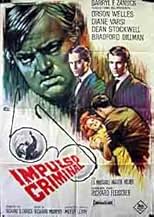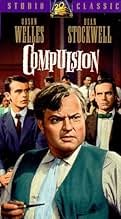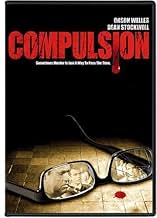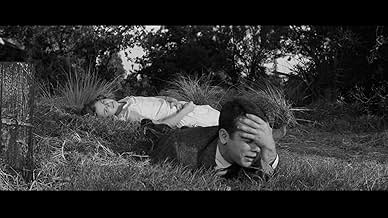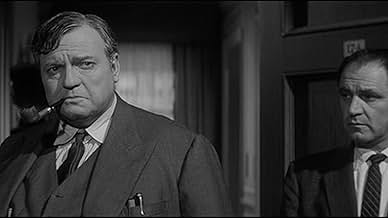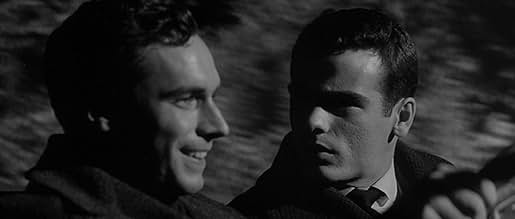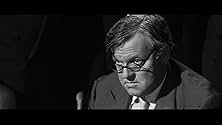AVALIAÇÃO DA IMDb
7,4/10
8,2 mil
SUA AVALIAÇÃO
Dois estudantes ricos da faculdade de direito vão a julgamento por assassinato nesta versão do caso Leopold-Loeb.Dois estudantes ricos da faculdade de direito vão a julgamento por assassinato nesta versão do caso Leopold-Loeb.Dois estudantes ricos da faculdade de direito vão a julgamento por assassinato nesta versão do caso Leopold-Loeb.
- Direção
- Roteiristas
- Artistas
- Indicado para 1 prêmio BAFTA
- 1 vitória e 5 indicações no total
Robert F. Simon
- Police Lt. Johnson
- (as Robert Simon)
John Alban
- Reporter
- (não creditado)
Don Anderson
- Reporter
- (não creditado)
Brandon Beach
- Courtroom Spectator
- (não creditado)
Terry Becker
- Benson - The Angry Reporter
- (não creditado)
Russ Bender
- Edgar Llewellyn - Attorney
- (não creditado)
- Direção
- Roteiristas
- Elenco e equipe completos
- Produção, bilheteria e muito mais no IMDbPro
Avaliações em destaque
We can add Welles to Wilde, Monroe and others who we never respected until they were gone. His pleading for the lives of those crazy boys (as Clarence Darrow did) is an eloquent plea for the ending of the death penalty. Funny, how a barometer like the death penalty tells us so much about a society's relative civility. The US had backed away from it, but is now swinging back toward even public executions (which I would much prefer, as they show all of us how barbaric we have become).
Note that the movie dwells on their 'craziness' and 'richness', not the Jewishness or the homosexual relationships that evoked the wrath of the public in the real case. Both Dillman and Dean Stockwell do an excellent job of drawing out your anger until you find yourself one of the mob yelling for blood. To stem the tide, in comes Orson Welles. Welles' phrasing and meaningful looks struck me again with what a magnificent actor he was, as well as director.
Now I have to go read 'Compulsion', the novel around which this movie was made, to determine what was left out and if it would have contributed to some of the obviously omitted details that make this movie a little choppy. This movie performs the task that great art must take on itself: to provide us insights into life and how it should be lived. That can be done either negatively or positively, by point or counter-point.
Of course, unless you had some excellent writers and actors of the stature of Welles, you wouldn't come up to the quality of this movie. Definitely, black and white contributed to the brooding quality of the film. Color would have detracted, and you'll seldom 'hear' me say this.
Note that the movie dwells on their 'craziness' and 'richness', not the Jewishness or the homosexual relationships that evoked the wrath of the public in the real case. Both Dillman and Dean Stockwell do an excellent job of drawing out your anger until you find yourself one of the mob yelling for blood. To stem the tide, in comes Orson Welles. Welles' phrasing and meaningful looks struck me again with what a magnificent actor he was, as well as director.
Now I have to go read 'Compulsion', the novel around which this movie was made, to determine what was left out and if it would have contributed to some of the obviously omitted details that make this movie a little choppy. This movie performs the task that great art must take on itself: to provide us insights into life and how it should be lived. That can be done either negatively or positively, by point or counter-point.
Of course, unless you had some excellent writers and actors of the stature of Welles, you wouldn't come up to the quality of this movie. Definitely, black and white contributed to the brooding quality of the film. Color would have detracted, and you'll seldom 'hear' me say this.
The real-life Leopold-Loeb murder case, which inspired Alfred Hitchcock's "Rope," among other films, is the basis for this story of a couple of rich young men committing a murder just for the thrill of trying to pull off the perfect crime. Stockwell and Dillman are well cast as the cold-blooded killers. The first half of the film, focusing on the strange relationship between the two men, their crime, and their arrest, is quite interesting. Then Welles shows up as the defense attorney and the film loses momentum. Welles seems to be sleep-walking through this one, and his final speech seems to take up about a third of the film.
Leopold was paroled after years of being a model prisoner, planning all kinds of prison reforms, and when released did philanthropic work in Puerto Rico. Interesting that Meyer Levin, author of book on which this film is based said, this amazingly redeemed man just a few times gave Levin a chill as it became clear that this character of 'St. Leopold' was just another creation of a true psychopath. The mocking narcissistic smirk was still there under it all.
For those who complain about the closing speech being too long.... The closing speech (about 15 minutes?) is excerpts from Clarence Darrow's actual closing remarks at the Leopold & Loeb film. The actual closing statements took 12 hours over two days (so be thankful it wasn't longer!) For that bit of historical inaccuracy I can forgive all the other stuff they weren't allowed to explore indepth in the film. It's also a good anti-capital punishment film. We know the boys are guilty so it's now a question of is it right to kill them as punishment?
I don't know why I'm so attracted to this vulnerable weirdos. From Anthony Perkins as Norman Bates in Psycho to Colin Firth as Adrian Leduc in Apartment Zero, darkness and a fragility that is part of the unbearable suspense. Maybe I'm in need of professional attention but I don't think so. What attracts me is by the undeniable innocence behind the horror and that has a lot, if not everything, to do with the actors playing them. Look at Anthony Perkins in Psycho! 57 years ago and it still looks and feels kind of revolutionary or Colin Firth in Apartment Zero, the character is so unique and real that you can see it a thousand times and always find some new extra something, then Dean Stockwell in Compulsion. He plays a monster, a sick, pathetic prince of a man. Yes all of that. The humanity of the actor makes the monster human and we can't dismiss him, he doesn't allow us. Orson Welles has a great entrance into the film and E.G Marshall is superb as per usual, it is the rest of the cast who seem a bit dated, specially when sharing the frame with the extraordinary Dean Stockwell
Você sabia?
- CuriosidadesBecause Orson Welles was having tax problems during the production, his entire salary for the movie was garnished several hours after principal photography was completed. This upset Welles so much that during the subsequent looping session to re-record improperly recorded dialogue, Welles suddenly stormed from the studio and left the country. All that was left to fix was twenty seconds of unclear dialogue in Welles' climactic courtroom speech, but editor William Reynolds managed to fix this problem without Welles. He took words and pieces of words that Welles had spoken earlier in the movie, and pieced them one by one into those last twenty seconds.
- Erros de gravaçãoWhen the murdered boy is in the morgue, his uncle recognizes him instantly, and the coroner doesn't mention to the young journalist (who found the glasses) that the kid had acid burned all over his face so he couldn't be identified. In the real life case, his face was burned and, most importantly, at the very end of the movie, Orson Welles as the defending attorney mentions that the murdered boy's face was burned with acid.
- Citações
Jonathan Wilk: If there is any way of destroying hatred and all that goes with it, it's not through evil and hatred and cruelty, but through charity, love, understanding.
- Cenas durante ou pós-créditosOpening credits prologue: CHICAGO, 1924
- ConexõesFeatured in The Paper Chase: Commitments (1983)
Principais escolhas
Faça login para avaliar e ver a lista de recomendações personalizadas
Detalhes
- Data de lançamento
- País de origem
- Idioma
- Também conhecido como
- Estranha Compulsão
- Locações de filme
- Empresa de produção
- Consulte mais créditos da empresa na IMDbPro
- Tempo de duração
- 1 h 43 min(103 min)
- Cor
- Proporção
- 2.35 : 1
Contribua para esta página
Sugerir uma alteração ou adicionar conteúdo ausente


